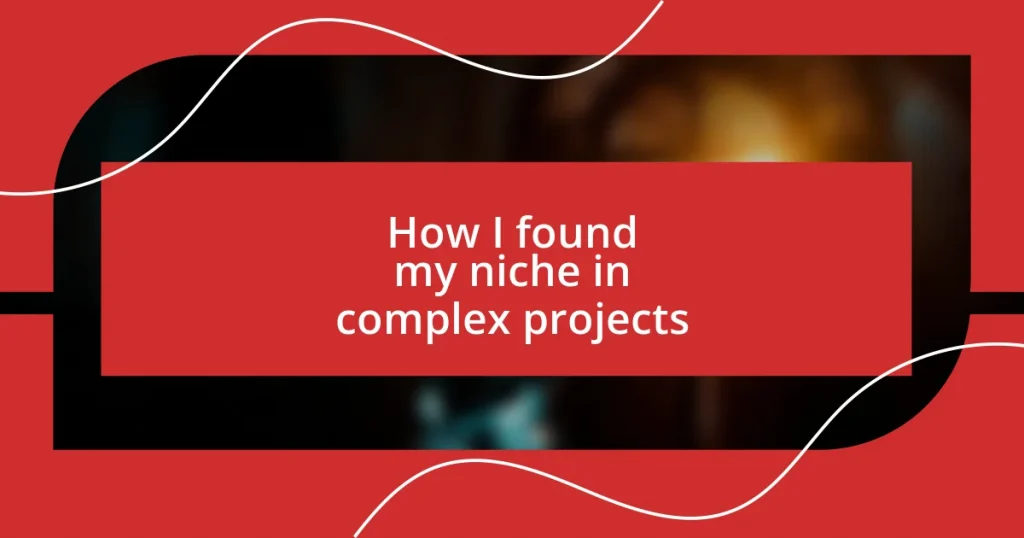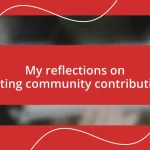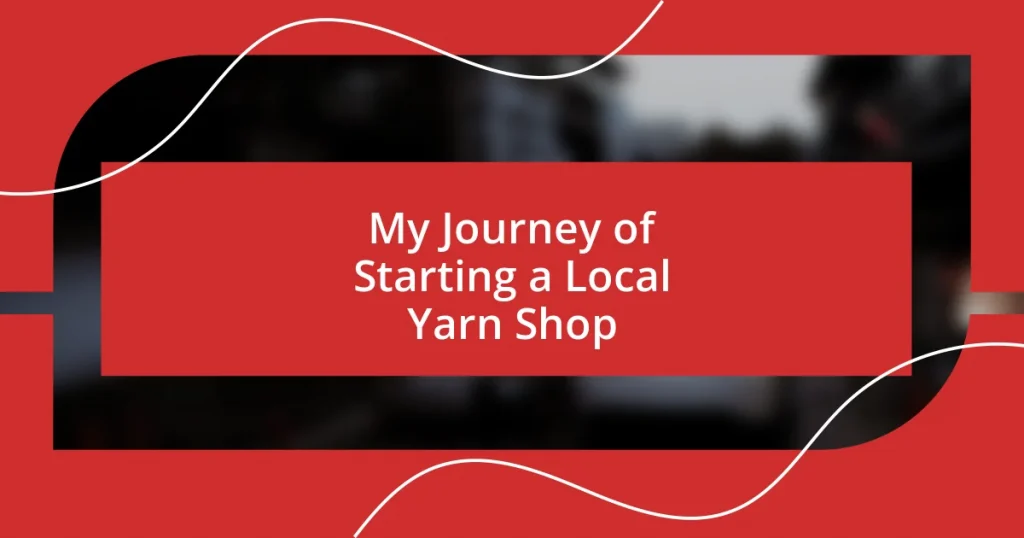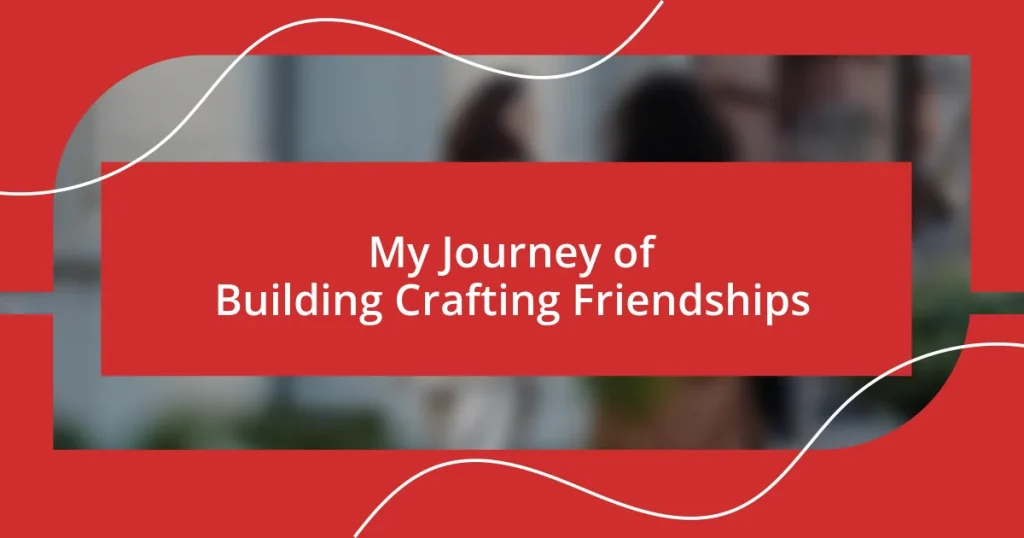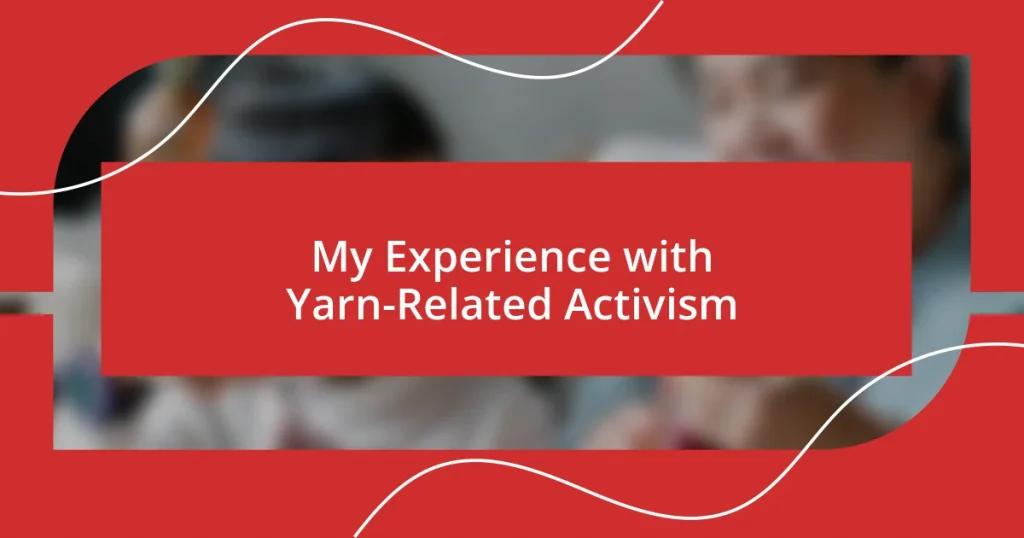Key takeaways:
- Identifying your skills and strengths is crucial for finding your niche, allowing you to align your capabilities with industry demands.
- Researching complex project demands helps illuminate opportunities, enabling you to understand where your skills fit within the landscape.
- Creating a unique value proposition involves recognizing your distinct strengths and incorporating feedback to effectively communicate your offerings to clients.
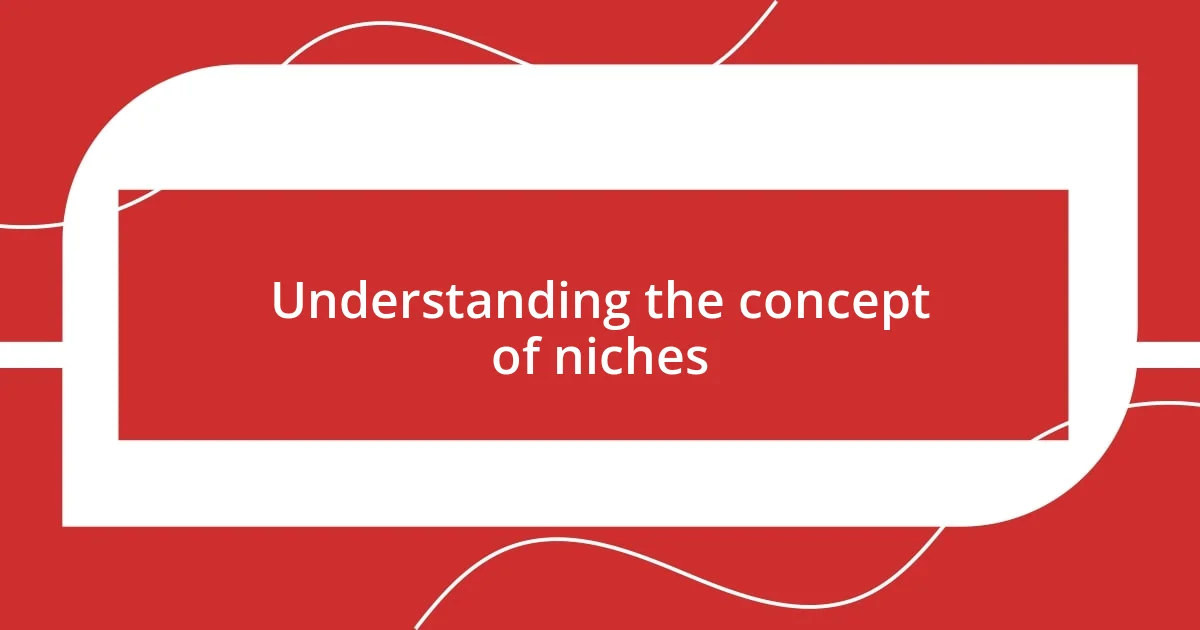
Understanding the concept of niches
A niche is essentially a specialized segment where one’s skills and interests intersect. I remember the moment I realized that my passion for complex projects could translate into a unique niche. Have you ever felt that rush of excitement when you find something that aligns perfectly with your strengths and interests?
When I first started working in my field, I encountered various challenges that required a specific expertise. It was during those demanding projects that I discovered not just what I was good at, but what truly energizes me. Doesn’t it strike you as fascinating how a challenging experience can lead to clarity about your niche?
Understanding your niche allows you to become a go-to person for particular problems, and that’s incredibly rewarding. I often reflect on how focused expertise can not only build trust with clients but also make the work feel fulfilling. Isn’t it amazing how carving out a space of your own can lead to both personal satisfaction and professional success?
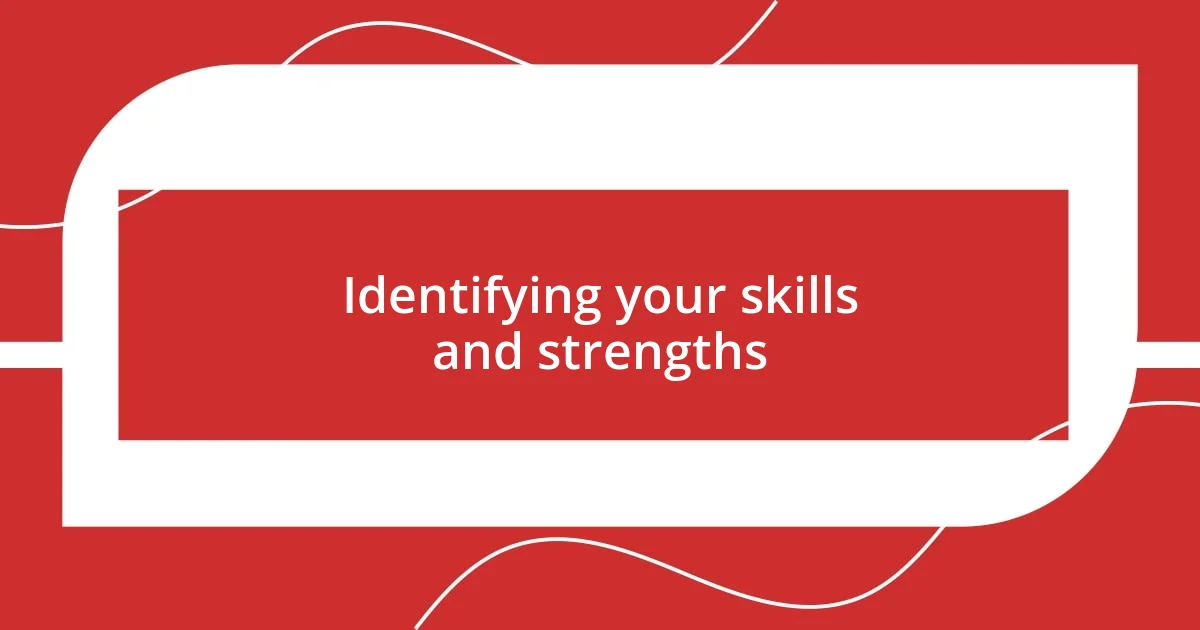
Identifying your skills and strengths
Identifying your skills and strengths is a crucial first step in pinpointing your niche. I recall sitting down with a blank piece of paper, trying to jot down everything I was good at. It was a mix of practical skills, like project management, and softer skills, such as effective communication. It felt liberating to acknowledge my capabilities, and this adventure into self-discovery ultimately shaped my career path.
I often recommend conducting a skills inventory. Write down your technical abilities, interpersonal skills, and even your interests that pique your curiosity. As I did this, I realized that my attention to detail, combined with my love for problem-solving, uniquely positioned me to tackle complex projects effectively. Have you ever taken the time to list your talents? You might be surprised at how many gems you uncover.
Once you’ve identified your strengths, it’s valuable to compare them with the demands of your field. While I excelled at bringing order to chaos, I found that many complex projects required that very skill. This alignment not only boosted my confidence but also ensured I was pursuing work that felt meaningful. Isn’t it energizing to think about what you’re genuinely capable of and how it fits into your niche?
| Skills | Strengths |
|---|---|
| Technical Expertise | Attention to Detail |
| Communication | Problem-solving |
| Project Management | Creative Thinking |

Researching complex project demands
Researching the demands of complex projects can feel like navigating a labyrinth, but it’s essential for discovering your niche. I remember diving deep into industry reports and case studies, seeking patterns behind the challenges faced in various projects. This research illuminated the intricate webs of expectations, timelines, and team dynamics that define complexity. Isn’t it intriguing how peeling back layers of information can reveal insights that feel tailor-made for your capabilities?
- Understand the specific requirements of different types of complex projects (e.g., tech integration, regulatory challenges).
- Identify commonly faced obstacles and how they relate to your skill set.
- Analyze competitor approaches and standout successes to glean what worked well for them.
- Engage with professionals in your field through networking events or online forums for real-time insights.
By immersing myself in the nuances of project demands, I began to see how my skills could provide solutions. It was like connecting the dots in a puzzle—every piece brought me closer to understanding where I fit in this complex landscape.

Exploring potential niche opportunities
Exploring potential niche opportunities means looking beyond traditional avenues and asking yourself where you can truly shine. I recall a time when a colleague mentioned the rising shift towards remote team management in our industry. This sparked an idea in me—wasn’t it fascinating how the landscape was changing? That conversation pushed me to further explore how I could leverage my skills in communication and organization specifically for remote projects.
As I delved deeper, I found niche communities focused on complex project dynamics, specifically in tech and creative industries. Joining online groups and forums proved invaluable; I encountered unique challenges that professionals faced daily. One discussion about navigating cultural differences in distributed teams made me realize that my past experiences managing diverse groups positioned me perfectly to fill this gap. Have you ever stumbled upon a conversation that changed the way you see your place in your industry? Those revelations are the gems that can guide you toward your niche.
Evaluating emerging trends is crucial as well. I remember attending a workshop on sustainability in project management, which opened my eyes to an underserved niche. I felt the adrenaline rush of discovery as I recognized how my skills could contribute to sustainable practices in complex projects. It was like a light bulb flicking on—suddenly, I was not just another project manager but someone who could impact the way projects were executed. Isn’t it exhilarating to uncover possibilities that align with your values and strengths? Exploring these avenues can lead to a profound sense of purpose in your work.

Evaluating market competition and gaps
Evaluating market competition and identifying gaps requires a strategic approach. I recall the first time I sat down with a competitor analysis chart; it felt like opening a treasure chest filled with insights. By scrutinizing their offerings, I pinpointed where they excelled and, more importantly, where they fell short. Isn’t it insightful how insights from competitors can illuminate potential opportunities?
As I dove deeper, I examined customer feedback and engagement patterns. One particular project caught my attention—clients consistently expressed dissatisfaction with a specific service aspect. Recognizing this gap was a turning point for me. I crafted a proposal to address these precise concerns, and watching my approach resonate with potential clients was incredibly rewarding. Have you ever felt that rush when you realize you can solve a problem others have overlooked? That’s the magic of identifying market gaps.
Moreover, I learned that trends are ever-evolving. I constantly keep an eye on emerging technologies and methodologies that competitors might not yet be embracing. For example, I once attended a seminar where a speaker highlighted the transformative power of AI in project management. At that moment, I recognized an opportunity to integrate AI tools into my service offerings, which not only set me apart but also allowed me to address the changing needs of clients. Isn’t it exhilarating to adapt and innovate in ways that keep you ahead of the competition?

Creating a unique value proposition
Creating a unique value proposition is all about understanding what sets you apart and articulating that clearly. I remember when I first recognized my ability to navigate tricky project landscapes. Clients often came to me feeling overwhelmed, and it dawned on me that my knack for simplifying complex processes could be my defining strength. Have you ever pinpointed a unique skill in yourself that you didn’t fully appreciate until others highlighted it? Realizing that your strengths can be your unique selling point is such an empowering moment.
As I refined my value proposition, I made a conscious effort to express not just what I did, but how I did it differently. I started incorporating storytelling into my pitches, painting vivid pictures of how I had tackled similar challenges in the past. One time, I shared a detailed narrative about a multi-faceted project where I helped a fragmented team unite around a common goal. The reaction was palpable; I could see the spark in their eyes. Isn’t it fascinating how sharing a personal experience can create connection and trust with potential clients?
Furthermore, I learned the importance of feedback in shaping my value proposition. At a networking event, I asked a potential client what they sought from a project manager. Their insights helped me tweak my messaging to emphasize my unique approach to problem-solving. This back-and-forth made me realize that creating a value proposition isn’t just about self-reflection; it’s also about listening to what others need. So, how often do you seek feedback to refine your own offerings? Gathering external perspectives can significantly enhance your understanding of the value you provide.

Thriving in your chosen niche
Thriving in a chosen niche requires a blend of confidence and adaptability. I remember when I first started to embrace my expertise in complex project management. It felt liberating to declare, “This is where I belong!” But it wasn’t just about claiming my spot; it was also about evolving as I learned—from client feedback to changing industry trends. Isn’t it fascinating how being rooted in one area can still give you the freedom to grow?
I found that networking played a pivotal role in my success. Attending industry events introduced me to mentors who shared not just their successes but also their failures. One late-night conversation really struck me—an experienced project manager emphasized the importance of building relationships, not just for business but for personal growth. Have you ever thought about how your connections might be the key to thriving in your niche? That night, I committed to not only engaging with others but genuinely listening to their stories.
Lastly, establishing a routine for continuous learning kept my skills sharp. I set aside dedicated time each week to read industry publications, take online courses, or even listen to podcasts while commuting. This simple practice opened my eyes to new methodologies and frameworks I could apply to my projects. How often do you take time for self-improvement? I discovered that sustaining growth is not just about passion; it’s also about renewing your knowledge to stay relevant and exciting in your field.










